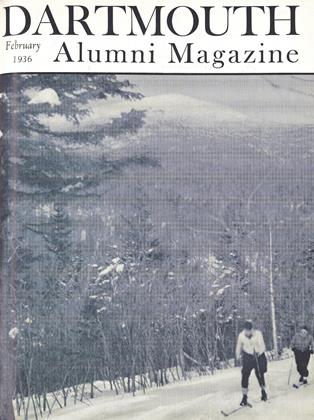Important curriculum changes, effective with next fall's entering class and involving the social science requirements for the degree, were announced on January 9 by President Hopkins, following their adoption by the faculty at its December meeting. These changes include the abolition of the semester courses in Problems of Industrial Society and Evolution, which have been in operation since 1919; the introduction of two new year courses, Social Science 1-2, which will be required of all freshmen, and Social Science 3-4; an enlargement of the socalled social science requirements for the bachelor's degree; the reduction of the present introductory courses, Economics 1-2, Political Science 1-2, and Sociology 1-2, to one-semester courses; and the replacement of the present joint majors in the social sciences by a new type to be called "topical majors."
Under the new degree requirement of twelve semester hours in social sciences, all students, starting with the Class of 1940, will be required to carry Social Science 1-2 in freshman year and to complete in sophomore year either two of the new semester courses, Economics 1, Political Science 1 and Sociology 1, or the new year-course, Social Science 3-4. This will replace the present requirement of semester courses in Industrial Society and Evolution, and of two year-courses to be chosen from two of the six departments of Economics, History, Philosophy, Political Science, Psychology, and Sociology. Since freshmen are not allowed to elect any other social science courses during their first year, there will almost certainly be an enlarged election by freshmen of the free elective courses in Classical Civilization and Philosophy.
TOPICAL MAJORS INTRODUCED
In addition to the present departmental majors in the social sciences, several so-called topical majors are to be introduced. Such topics as "International "The Relation of Government to Business," "Social Reconstruction" and "Race and Nationality" will form the basis of these new majors which are designed to cut across departments and to give students a chance to integrate materials which they have acquired in individual courses in the social science departments. The topical majors will replace the joint majors which are now being offered in Economics-Political Science, History-Political Science, and His tory-Sociology.
The new course for freshmen, Social Science 1-2, will be under the chairmanship of Professor John G. Gazley, and in general will be staffed from the Department of History as a nucleus, with additional instructors from the departments of Economics, Political Science, and Sociology. The course will show the growth of modern institutions covering the period chiefly from the Industrial Revolution to the present time. It will be primarily European in content, but relevant American material will be included. Considerable stress will be placed on economic, political, and social factors, and emphasis will be given to developments since 1870.
The sophomore course, Social Science 3-4, under the chairmanship of Professor Robert E. Riegel, will be offered for the first time in the academic year 1937-38. It is primarily designed for men who do not expect to major in the social sciences and who do not wish to elect Economics 1, Political Science 1, or Sociology 1. It will be an integrated course in contemporary problems, with materials drawn from the fields of Economics, History, Political Science, and Sociology.
Although nothing radical or particularly new is involved in the revised social science requirements, they do insure that every student in Dartmouth College shall be required to give some thought to the economic, historical, political, and sociological patterns in the moden social fabric. It was for this primary purpose that the new curriculum change was adopted.
Classroom. Picture of the President-Elect of Hobart College Professor William A. Eddy of the department of English leaves Hanover at the end of this college year to begin his duties as president of Hobart College, Geneva, New York. His official and personal relationships at Dartmouth have been an important and pleasant part of the life of the College and the community since 1928.
 View Full Issue
View Full Issue
More From This Issue
-
 Article
ArticleGRADUS AD PARNASSUM
February 1936 -
 Article
ArticleDartmouth's Olympic Skiers
February 1936 By Robert P. Fuller, '37 -
 Class Notes
Class NotesClass of 1911
February 1936 By Prof. Nathaniel G. Burleigh -
 Article
ArticleEdwin Brant Frost, Class of 1886
February 1936 By Arthur Fairbanks '86 -
 Class Notes
Class NotesClass of 1934
February 1936 By Martin J. Dyer, Jr. -
 Class Notes
Class NotesClass of 1908
February 1936 By L. W. Griswold
Article
-
 Article
ArticleTHE CLASSICS "ON THEIR OWN"
June 1931 -
 Article
ArticleDr. Adams '15 Honored
November 1968 -
 Article
ArticleDartmouth profs propose new theory on dinosaur extinction
MARCH • 1986 -
 Article
ArticleSelf-Service
June 1952 By C. E. W. -
 Article
ArticleJazz Man
December 1975 By M.B.R. -
 Article
ArticleA CASE FOR THE CLASSICS
April 1933 By Richard J ackson '33

